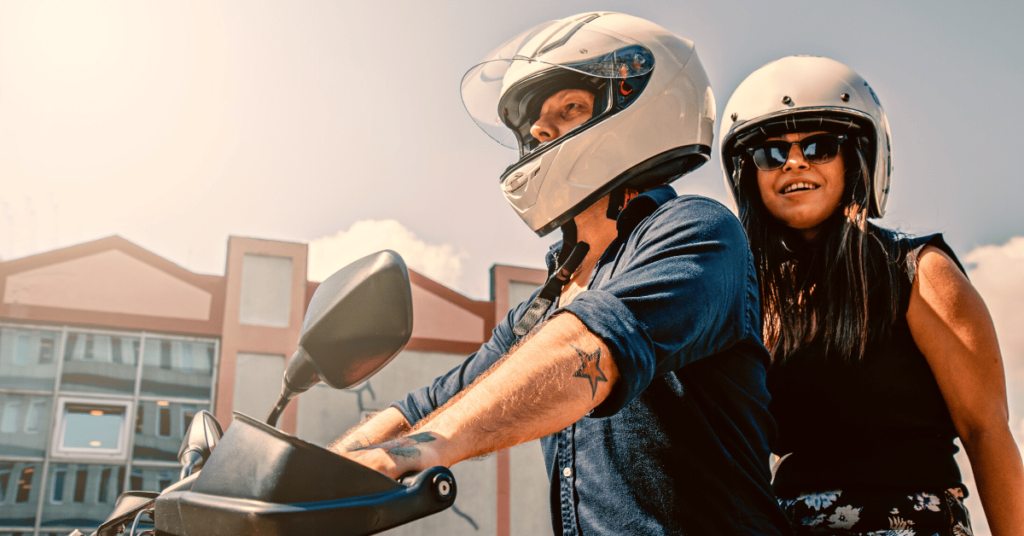
Are you an NC resident wanting to explore the amazing scenery of North Carolina, from the Blue Ridge Mountains to the Outer Banks, on your motorcycle? The laws for motorcycle licensing and safety vary from state to state. Learn more about the rules for riding a motorcycle for beginners in North Carolina below. These rules help riders know what to do when facing a safety risk on the road.
Motorcycle Endorsement Learner’s Permits for Riders Under 18
Riders must be at least 16 years old to apply for their motorcycle learner’s permit. You must also already have a North Carolina driver’s license or full provisional license. With the signature of a parent or guardian, you can apply for a motorcycle permit. You will need:
● Appropriate ID including proof of name, date of birth, Social Security number, legal presence or citizenship in the U.S., and North Carolina residency
● A passing score on the written knowledge tests for motorcycle licensing and traffic sign identification
● Acceptable vision screening results
● Payment for the motorcycle permit fee of $21.50
Your motorcycle permit will be valid for 12 months, and you can renew it one time for an additional six months. Riders under 18 must also complete a motorcycle safety course to apply for their motorcycle endorsement. You may not carry passengers on a motorcycle permit.
Motorcycle Endorsement on Drivers’ Licenses in North Carolina
If you are over 18, you may apply directly for your motorcycle endorsement. You will need the same IDs, vision screening, and written tests as a permit rider. However, you must also pass the on-road motorcycle skills test to get your motorcycle endorsement.
Riders under 18 years of age may apply for their motorcycle endorsement after holding their learner’s permit for 12 months. You must show certification from your motorcycle safety course to qualify for a motorcycle endorsement.
Once you pass all the requirements, you will need to pay your motorcycle endorsement fee of $2.55 for each year you hold your endorsement.
North Carolina Basic Rider Course Education
Approved courses include the Basic Rider Course through the Motorcycle Safety Foundation (MSF) or the North Carolina Motorcycle Safety Education Program (MSEP). These courses teach the rules for riding a motorcycle for beginners in North Carolina.
These classes instruct new riders in motorcycle safety, performing specific maneuvers, safely stopping, sharing the road with other bikers and drivers, and handling a bike in an emergency.
Completing the MSF or MSEP safety course could lower your insurance premiums.
Helmet and Motorcycle Equipment Laws
All motorcyclists in North Carolina must wear DOT-approved helmets with manufacturer-applied DOT stickers. The helmet’s inner lining should include at least one inch of polystyrene foam padding to support your head in a crash.
To be deemed street-legal all bikes must have:
● Working turn signals
● A horn audible to at least 200 feet
● Two side view mirrors with at least 200 feet of visibility behind the rider
● Working front and rear brakes
● Working taillight and brake light
● Working headlight, at least one, with no more than two connected to a single switch
● Working white license plate light
● Working muffler with no modifications
Make sure to occasionally review the latest safety standards, as regulations can sometimes change to improve safety for bikers and other drivers, and because laws often differ between states.
Call Us at Law Tigers for Motorcycle Lawyers in North Carolina
Riding motorcycles can sometimes be dangerous, especially when traveling. This guide to riding a motorcycle for beginners in North Carolina is not a comprehensive list of all the skills you will need to ride a motorcycle safely.
At Law Tigers, we’re attorneys who ride. We fight for the rights of bikers around the country hurt in motorcycle accidents and their families. If you need help with a motorcycle accident injury claim, call us at 1-888-863-7216 for a free case evaluation.
And stay protected by carrying Law Tigers free rider benefit card.



